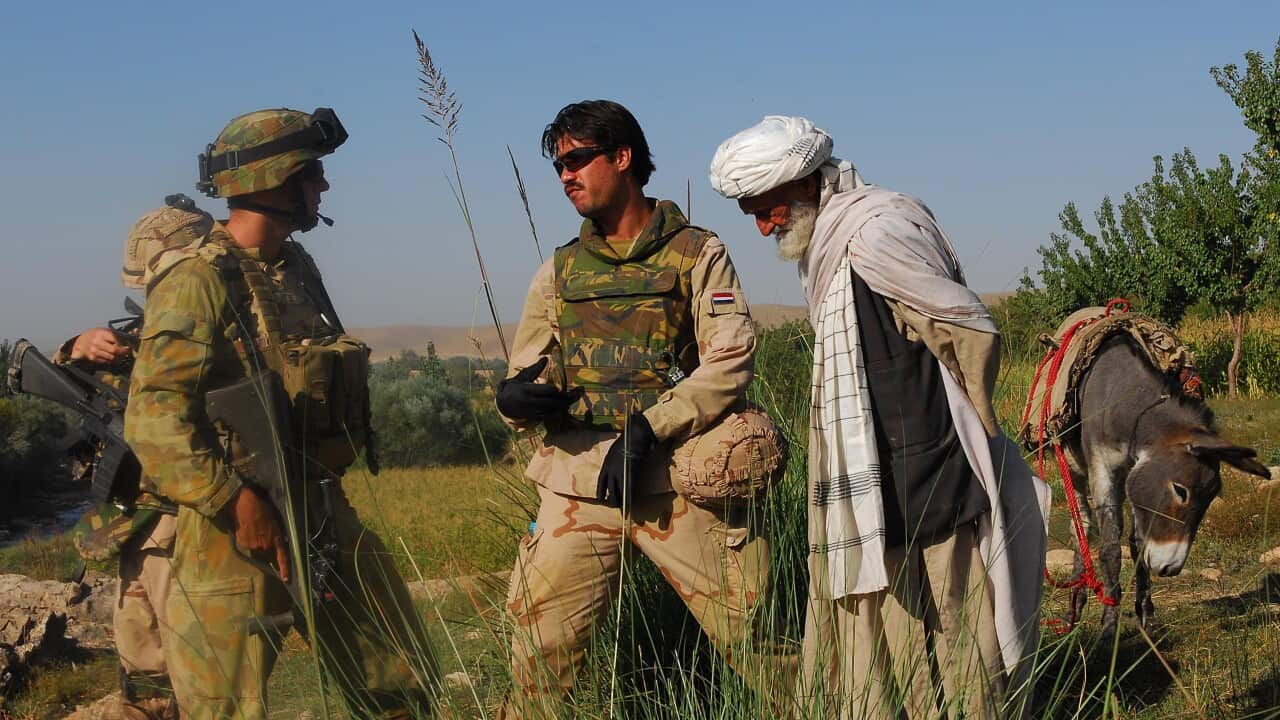Key Points
- Three Afghan men who worked with the ADF have completed a 700km protest walk to Canberra.
- They held a peaceful demonstration in front of Parliament House.
- They claim the government is not doing enough to repatriate the families of those who helped the ADF in Afghanistan.
On 20 July, three former ADF employees, Qutbiallam Timor, Ahsanullah Sherzad and Mohammad Nazir Mangal, started a 700km walk from Dandenong to Canberra to advocate for the safety and freedom of extended families in Afghanistan.
Mr Timor, president of the Afghan Locally Engaged Employee (LEE) Alliance, worked as a business advisor with AusAID in Afghanistan between 2012 and 2013.
Mr Timor said that former Afghan LEEs were concerned for “the safety of their extended families” and that they had raised their concerns with the Australian government on “multiple occasions” but that the government had “not responded positively”.
“The Afghan LEE Alliance organised this long walk of nearly 700km (Dandenong to Canberra) as a civil movement to deliver and share the concerns of Afghan LEEs with the Australian government and parliamentarians,” he said.
“(Embarking on the) long walk was a tough decision but we didn’t have any other options as (we feel that our) concerns regarding the safety of (our) extended families were being ignored."
We chose this long walk as an effective option to raise awareness of the high level of concern and stress former Afghan LEEs have for the safety of their extended families.Qutbiallam Timor

Afghan LEE Alliance president, Qutbiallam Timor (L), Mohammad Nazir Mangal (centre) and Ahsanullah Sherzad (R) Credit: Supplied
‘Full of challenges’
Mr Timor told SBS Pashto that the walk had been difficult but that its purpose was greater than any physical hardships experienced.
“Along the way we have suffered from blisters, cold nights, rainy and windy weather, feet and bone pains, nights in the forests (exposed to) wildlife, deficiencies of food and water until to got to a shop and the lack of phone and internet reception,” he said.
“(On the other hand) Along the way, we were welcomed by the refugee advocates, Afghan community members from Melbourne, and local residents.
“Today, here we are welcomed and received in front of Parliament House by the Canberra Refugee Action Campaign (RAC) and they provided a PA system for our protest as well.”
‘Demands of the government’
Mr Timor said that the former Afghan LEEs had “three simple demands” of the Australian government to address the safety of Afghan LEEs’ extended families remaining in the war-torn country.
“Prioritise Afghan LEEs’ extended families’ visa applications for humanitarian visas and allocate 5000 humanitarian visa places for Afghan LEE’s extended families; stop refusing in-country visa applications for Afghans; and reconsider processing the recently refused humanitarian visa applications,” he said.
“Afghan LEEs are concerned and (are) mentally suffering over the safety of their families, as many Afghan LEEs’ extended families have experienced threats pre and post the fall of Kabul.”

Former LEEs during a peaceful protest in front of Parliament House. Credit: Supplied
Dozens more join protest in Canberra
In addition to the walk's participants, dozens of former Afghan LEEs also travelled from Sydney, Melbourne and Adelaide to Canberra to participate in the peaceful protest and show support for the demands made by the long walk group members.
Abdul* is a former Afghan LEE who travelled from Melbourne to Canberra to participate in the peaceful protest. He worked alongside Australian forces as an interpreter and cultural adviser in Uruzgan and Kandahar between 2010 and 2013.
Abdul* arrived in Australia weeks before the Taliban gained control of Afghanistan and currently resides in Melbourne without his family members. He mentioned that he submitted a humanitarian visa application for his family about two years ago, but he has yet to receive any update regarding the status of the application.

Former ADF interpreter, Abdul*, in Uruzgan, Afghanistan. Credit: Supplied
“(The) Situation is very bad for our families [LEEs' families] in Afghanistan.
“We helped (the ADF) in very difficult situations, there were suicide attacks on them in several places, we even gave First Aid to our team and then we gave blood to them in the hospital.”
In late July, a spokesman for the Department of Home Affairs told SBS Pashto that the government remained committed to supporting the Afghan community and had allocated 26,500 dedicated places in Australia’s Humanitarian Program for Afghan nationals through to 2025-26.
“Afghanistan remains the top source country in terms of humanitarian visa grants and the Department of Home Affairs continues to prioritise humanitarian visa applications from certified Afghan LEEs and their families,” the spokesperson said.
“Processing times can vary according to the capacity of the Humanitarian Program, the particular circumstances of the applicant, their location (be it inside or outside their home country), and their ability to travel, provide documents or access to Australian government officials.”

Credit: Department of Home Affairs
The government had agreed to all eight recommendations of a recent independent review of the Afghan LEE program, the spokesperson said.
* Name changed due to safety concerns.




